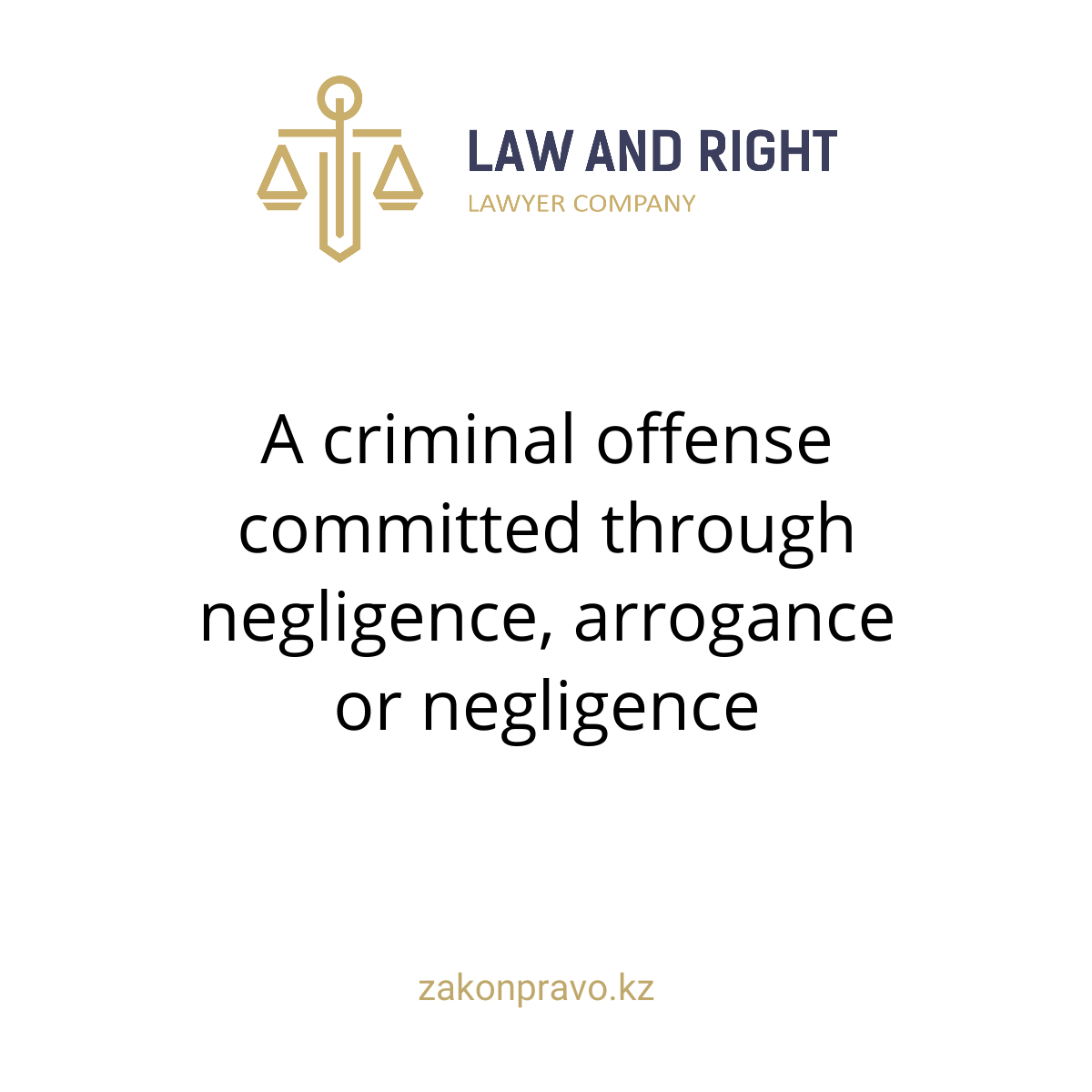A criminal offense committed through negligence, arrogance or negligence
🔹 1. General Characteristics of Negligent Guilt
Negligence is a form of guilt where a person either:
- foresees the possible consequences but recklessly hopes to prevent them (recklessness), or
- does not foresee the consequences at all, although they were obliged to do so (carelessness).
Legal significance:
- The form of guilt is crucial for the qualification of the offense;
- For the question of criminal liability;
- And for the sentencing (see Articles 53, 54 of the Criminal Code of the RK).
🔹 2. Recklessness (Part 2 of Article 21)
The person:
- Foresees the possibility of harmful consequences;
- But recklessly relies on their prevention — without reasonable grounds.
✅ Case example:
A doctor, aware of a patient’s potential allergic reaction to a drug, still administers it, hoping "it'll be fine" — resulting in the patient's death.➡ This is recklessness, not direct intent, as the doctor did not desire the death but foresaw the possibility and unjustifiably relied on avoiding it.
🔹 3. Carelessness (Part 3 of Article 21)
The person:
- Did not foresee the consequences;
- But should have and could have, based on the situation, their official duties, education level, life experience, etc.
✅ Case example:
A construction worker fails to properly secure a concrete slab, which falls and kills a person.➡ The worker did not foresee the consequence, but should and could have, as it was part of their professional responsibility. This is carelessness.
🔹 4. Difference from Intent (Article 20 of the Criminal Code)
| Indicator | Intent (Art. 20) | Negligence (Art. 21) |
|---|---|---|
| Foresight of consequences | Yes | Yes (recklessness); No (carelessness) |
| Desire for consequences | Yes (direct intent); No, but accepts (indirect intent) | No |
| Risk assessment | Conscious assessment | Either recklessness or oversight |
🔹 5. Legal Consequences
❗ Not every crime can be committed through negligence.
❌ For example, theft, robbery, rape, terrorism — these can only be committed with intent.
✔ On the other hand, crimes against life and health, safety regulations, or traffic rules — are often committed through negligence, such as:
- Art. 104 CC RK — Causing death by negligence;
- Art. 345 CC RK — Violation of traffic rules causing serious consequences;
- Art. 279 CC RK — Violation of industrial safety rules.
🔹 6. Normative Resolutions of the Supreme Court of the RK
📜 Normative Resolution No. 1 of March 11, 2016"On the application by courts of the legislation on criminal liability for crimes committed through negligence"➡ Explains:
- The distinction between recklessness and carelessness;
- The need to assess subjective attitude toward consequences;
- Particulars of proving negligence.
📜 Normative Resolution No. 2 of December 25, 2020"On certain issues of qualification of crimes against life and health"➡ Specifies that, when harm is caused negligently, it is crucial to establish:
- The required level of foresight;
- The possibility of prevention under ordinary attentiveness.
🔹 7. Criminal Procedure Code of the RK (CPC RK)
🔹 Article 113 CPC RK — Subject of proof:
- The form of guilt must be proven;
- Motivation and intent must be evaluated in conjunction with intellect, will, and behavior.
🔹 Article 125 CPC RK — Evaluation of evidence:
- The court evaluates based on inner conviction: conclusions must be drawn from facts, not assumptions.
🔹 8. Related Provisions from Other Codes
🔹 Civil Code of the RK (Art. 923)— Damage caused by negligence is subject to compensation.— This applies in parallel civil liability cases.
🔹 Code of Administrative Offenses (CAO RK)— Many administrative violations are committed through negligence (e.g., in sanitation, traffic rules, etc.).
🧾 Conclusion
The form of negligent guilt is a key legal concept, determining:
- Whether a criminal offense occurred;
- Whether criminal liability can be imposed;
- The correct legal qualification and sentencing.
Courts are required to examine not just the facts, but also the individual’s internal attitude toward the consequences. The distinction between recklessness and carelessness demands subtle analysis, supported by evidence, expert opinions, and the person's behavior before and after the act.
Attention!
Law and Law Law Law draws your attention to the fact that this document is basic and does not always meet the requirements of a particular situation. Our lawyers are ready to assist you in legal advice, drawing up any legal document suitable for your situation.
For more information, please contact a Lawyer / Attorney by phone: +7 (708) 971-78-58; +7 (700) 978 5755, +7 (700) 978 5085.
Attorney at Law Almaty Lawyer Legal Services Legal Advice Civil Criminal Administrative Cases Disputes Protection Arbitration Law Firm Kazakhstan Law Office Court Cases


